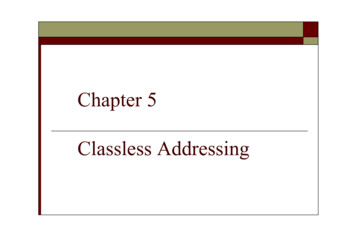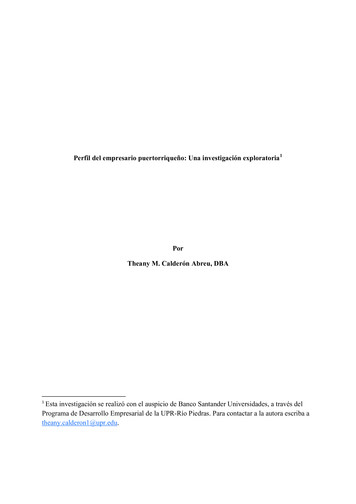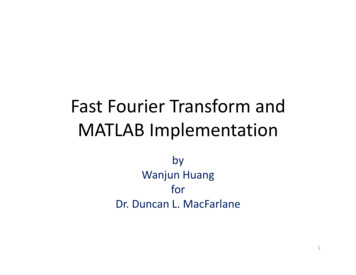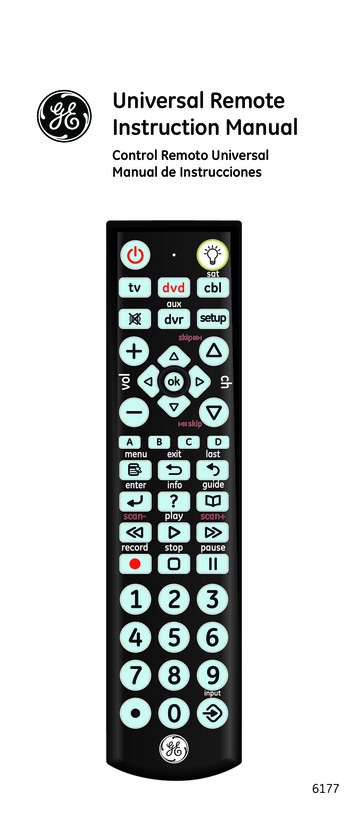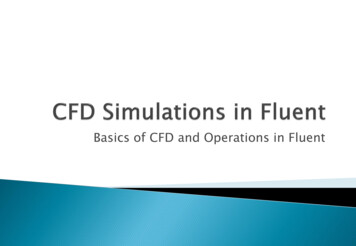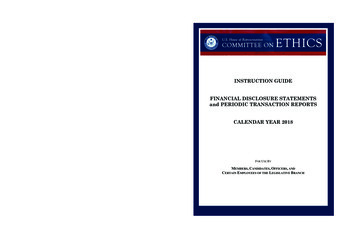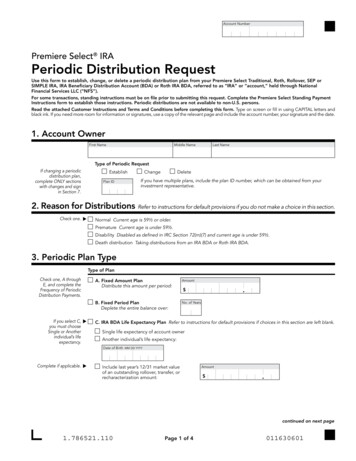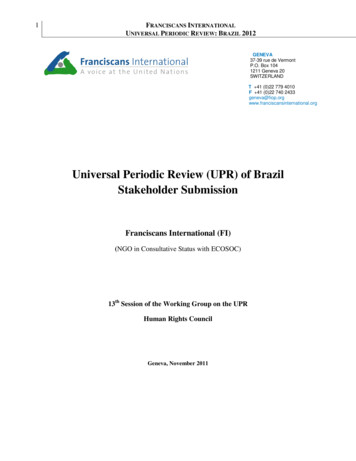
Transcription
1FRANCISCANS INTERNATIONALUNIVERSAL PERIODIC REVIEW: BRAZIL 2012GENEVA37-39 rue de VermontP.O. Box 1041211 Geneva 20SWITZERLANDT 41 (0)22 779 4010F 41 (0)22 740 gUniversal Periodic Review (UPR) of BrazilStakeholder SubmissionFranciscans International (FI)(NGO in Consultative Status with ECOSOC)13th Session of the Working Group on the UPRHuman Rights CouncilGeneva, November 2011
2FRANCISCANS INTERNATIONALUNIVERSAL PERIODIC REVIEW: BRAZIL 2012Introduction1. Franciscans International submits written comments concerning Brazil for considerationby the Universal Periodic Review Working Group at its 13th session, from 21 May to 1June 2012. FI is a faith based International Non-Governmental Organization (INGO) withGeneral Consultative Status with the Economic and Social Council of the United Nations.It was founded in 1982 to bring to the UN the concerns of the poor and the mostvulnerable. This submission was prepared on behalf of Franciscans working at thegrassroots level. FI conducted an in-country training on the Universal Periodic Review inBrazil, in June 2011.2. The report highlights key concerns related to two systemic problems that directly affectour partners in their work for the protection and promotion of human rights in Brazilwith an emphasis on those that are most vulnerable to violations: (I) the lack ofguarantees for human rights defenders, particularly in their pursuit of guarantees of landrights, of environmental protection, and the rights of indigenous peoples; and (II) thefailure to guarantee the minimum conditions for female inmates detained in stateinstitutions.3. Human-rights defenders often assume great risks—and too often, great costs—in aneffort to advance the cause of those most vulnerable and marginalized in the face ofconsolidated, powerful forces. The compliance of a State with the respect for andprotection of the rights of human rights defenders warrants separate considerationbecause it is relevant to the rights of particular individuals and groups, but also becauseit is a concrete manifestation of the State’s political will to promote human rights anddemocracy based on the rule-of-law.4. The situation of female inmates is also deserving of specific evaluation, particularlybecause the population of the women’s prisons is quite large but often invisible in themidst of a much larger and highly problematic men’s prison system. These individualsare under the complete control and custody of the state and therefore the obligation andpotential to guarantee prisoner rights and dignified conditions is very high.I.Situation of Human rights DefendersA. Background: Institutional and Legal Framework5. Because of an understanding of ―the importance of their efforts and the need to createconditions and instruments to protect these persons,‖1 the Special Human RightsSecretariat created the National Human Rights Defenders Protection Program (PPDDHor ―Program‖) in October of 2004. The Program was officially launched in February2005. Two years later the President established formally a National Policy for the1Human Rights Secretariat, Protection for Human Rights Defenders, available nsores.
3FRANCISCANS INTERNATIONALUNIVERSAL PERIODIC REVIEW: BRAZIL 2012Protection of Human Rights Defenders.2 The objective of this policy was ―to establishprinciples and directives of protection and assistance to persons or entities, groups,institutions, organizations, or social movements that promote, protect and defend humanrights, and, which as a result of their actions and activities in these areas find themselvesat risk or vulnerable.‖36. The current structure is regulated only by decree; however a draft law, Bill 4575/2009has passed in four congressional commissions (House of Representatives), and at thetime of this writing is awaiting debate before a plenary session. The Bill sets out themechanisms of the different institutional roles and establishes the conditions for enteringunder the program’s protection.7. These normative and institutional advancements are positive national affirmations ofagreement with the increasing international recognition of the importance of the role andrights of human rights defenders. The legislative and executive actions also constitute animportant recognition of the precarious situation of human rights defenders in thecountry and the urgent need for State protection.8. Unfortunately, the Program has not received enough priority and political will to createan effective and efficient structure for implementation. The structure of the Program hasbeen criticized as overly bureaucratic, under-funded, and lacking in clarity in terms offederal and state competencies. Despite its name, the program is not yet national and isbeing implemented in only 8 of Brazil’s 26 states.4B. Promotion and Protection of Human Rights on the Ground: Implementation of InternationalHuman Rights Obligations9. The continued physical violence, threats, and judicial harassment against defenders ofthe right to land, indigenous peoples’ rights, and environmental rights has been widelydocumented and denounced by national and international civil-society organizations;5 bythe Inter-American system for the protection of human rights; 6 and by the SpecialRapporteur on the situation of human rights defenders.72Presidential Decree no. 6044, ―approving the National Policy for the Protection of Human Rights Defenders(PNPDDH), defining the timeline for elaborating the National Plan for the Protection of Human Rights Defenders,inter alia,‖ (Feb. 12, 2007).3Presidential Decree no. 6044, art. 1.4Pará, Pernambuco, Bahia, Espiritu Santo, Rio de Janeiro, Minas Gerais, Maranhão, and Sergipe.5See, e.g., Observatory for the Protection of Human Rights Defenders, Annual Report 2011; Terra de Direitos &Justiça Global, Boletim: Defensoras e Defensores de Direitos Humanos no Brasil.6E.g., Inter-American Commission, Precautionary Measures, PM 382/10 – Indigenous Communities of the XinguRiver Basin, Pará, Brasil (April 1, 2011) (modified July 29, 2011); Inter-American Court of Human Rights, Case ofEscher er al. v. Brazil, Preliminary Objections, Merits, Reparations, and Costs, Series C. No. 200 (July 6, 2009).7Most recently, Report of the Special Rapporteur on the situation of human rights defenders, Margaret Sekaggya,Summary of cases transmitted to Governments and replies received, UN Doc. A/HRC/16/44/Add.1 (Feb. 27, 2011).
4FRANCISCANS INTERNATIONALUNIVERSAL PERIODIC REVIEW: BRAZIL 201210. A major obstacle for the promotion and protection of the free exercise of the rights ofhuman rights defenders is continuing rural conflicts that are not resolved in ademocratic, peaceful manner with a respect for the rule of law. In April 2011, thePastoral Land Commission (Comissão Pastoral da Terra) produced a review of thedocumentation that this movement has collected regarding the levels of rural violentconflict in Brazil from 2001 to 2010.8 As can be seen in the graphic representationsincluded below as Annex 1, the context for the protection of human rights defendersremains one of a persistently elevated level of violent conflict being resolved outside ofthe formal and legal channels of the State. Therefore, in terms of fulfilling its obligationsto guarantee the rights of human rights defenders working in the areas of land rights,environmental protection, and indigenous and minority rights, it is particularly importantthat the State adequately address the sources of tensions and ensure democratic andpeaceful resolution in accordance with Brazilian and international law.11. Prosecutorial/judicial intervention in rural conflicts must be guided by the core rule-oflaw principles, such as due-process rights, equality before the law, and victims’ access tojustice and right to reparation. Particularly in contexts of widespread impunity forviolence committed against human rights defenders, community leaders, and activists,the swift action of the judicial branch in some cases to threaten or initiate criminal actionagainst leaders appears arbitrary and interested in terms of the different forces in theconflict. The stigmatization and/or criminalization of legitimate efforts to seekguarantees for legal rights contribute to the vulnerability of these individuals and groups.C. Follow-up to the Previous Review12. During its first periodic review, Brazil recognized the need to improve the system ofprotection of human rights defenders throughout the country9 and accepted therecommendations, two of which call for evaluation, intensified efforts, and cooperationto improve protection of human rights defenders.1013. Despite advancements in recognizing the nature and urgency of the situation of humanrights defenders in Brazil, the State has been reluctant to cooperate productively withinternational bodies/mechanisms. The Inter-American system for human rights has beenan important source of support and protection for human rights defenders facing threats.However, the Brazilian State has actively resisted and opposed measures ordered by theInter-American Court.11 Also, the thematic Special Rapporteur has highlighted onseveral occasions the Brazilian government’s failure to respond to her communicationsregarding urgent appeals and other matters. She cited 19 different communications that8The following graphs represent the statistics reported by the Pastoral Land Commission (Comissão Pastoral daTerra), Conflitos no Campo: Brasil 2010, ISSN – 1676 – 661 (Goiânia, April 2011).9Human Rights Council, Report of the Working Group on the Universal Periodic Review of Brazil,A/HRC/8/27, (May 22, 2008), paragraphs 15 & 23.10Ibid, paragraph 83: (3)-(4).11Most notably, the case of the precautionary measures ordered for the communities in the Xingu River Basin.
5FRANCISCANS INTERNATIONALUNIVERSAL PERIODIC REVIEW: BRAZIL 2012went without response,12 and has reiterated her ―serious concerns expressed earlier atattacks against the life and personal integrity of Brazilian human rights defenders,‖ andparticularly of ―the continuing violations committed against human rights defendersworking to promote the rights related to land ownership and the rights of indigenouspeoples, and labor rights.‖13D. Recommendations14. Franciscans International urges the Government of Brazil to:a) Set up an Independent Commission of Inquiry to deal with serious allegations of gravehuman rights violations of human rights defenders;b) Conduct comprehensive investigations into violations and abuses perpetrated againsthuman rights defenders and ensure that the perpetrators are brought to justice;c) Reform the existing structure for the implementation of the Protection Program providingit with adequate resources and ensuring that it has a greater input in the formulation ofpublic policy;d) Ensure the implementation of the Protection Program at the national level, in partnershipwith state governments and a broad range of civil society actors;e) Compile disaggregated statistics of cases against human rights defenders in line with therecommendations made by the Special Representative of the Secretary-General on thesituation of human rights defenders after her country visit to Brazil in 2005.II.Situation of Female PrisonersA. Background: Institutional and Legal Framework15. According to the Secretariat for Policies for Women of the state of Rio Grande do Sul,the total population of incarcerated women in Brazil has grown five-fold in recent years,mostly an increase in detentions for drug-related charges/convictions.14 As of October2011, it was cited that the total population of female inmates in Brazil is approximately26,000.15 However, it is often cited that women make up only 6% of the total prisonpopulation in Brazil. Brazil has been widely denounced for its prison conditions, and thefederal government tends to acknowledge the severity of the situation.16. Importantly, an Inter-ministerial Working Group was created through a presidentialdecree issued on May 25, 2007, to ―make proposals for the reorganization and12Human Rights Council, Report of the Special Rapporteur on the situation of human rights defenders, MargaretSekaggya, Summary of cases transmitted to Governments and replies received, UN Doc. A/HRC/16/44/Add.1 (Feb.27, 2011).13Human Rights Council, Report submitted by the Special Rapporteur on the situation of human rights defenders,Margaret Sekaggya, Summary of cases transmitted to Governments and replies received, UN Doc.A/HRC/10/12/Add.1 (Mar. 4, 2009).14Results of the Women’s Policy Secretariat: Progress and Challenges in the Confronting Violence against Womenin Rio Grando do Sul, Apr. 4, 2011, available at http://www.spm.rs.gov.br.15Presidency of the Republic, Report of the Special Secretariat for Women’s Policy, Year IV, No, 4, Oct. 10, 2011.
6FRANCISCANS INTERNATIONALUNIVERSAL PERIODIC REVIEW: BRAZIL 2012reformulation of the Women’s Prison System.‖ This Group has conducted an importantdiagnosis of the situation of female prisoners and proposed emergency measures.17. Despite important policy advances at the federal level, there has been uneven andgenerally unsatisfactory progress at the state level—constitutionally where prisonmanagement and police functions depend. Regardless, under international law it is theBrazilian Federal State that must ensure the satisfaction of the obligations that it hassovereignly assumed and the federal government has several means to increase pressureon states to improve compliance of these human rights obligations.B. Promotion and Protection of Human Rights on the Ground: Implementation ofInternational Human Rights Obligations18. Over-crowding in women’s prisons—as in men’s—is the most readily identifiableobstacle to guaranteeing the rights of those under state custody. This problem is widelydiscussed in the broader analysis of the prison system. To illustrate the problemspecifically for the female population, the state of São Paulo is a helpful example.19. The state of São Paulo has made improvements in its treatment of female prisoners. Apositive practice of the Penitentiary Administration Secretariat is that of maintaining upto-date, detailed statistics, disaggregated by sex, for the population of each detention orcorrectional facility. However, these numbers reveal that out of a total of 15 detentionscenters for females, 11 present overcrowding beyond maximum capacity.16 The degreeof the overcrowding varies from between 3 and 593 inmates over capacity, and frombetween an operating capacity of 103% of the maximum to a staggering 336% of themaximum capacity17.20. Stemming from the overall panorama illustrated with the case of the state of São Paulo,the female inmate population has seen sex/gender-specific violations in addition toviolations and deficiencies reported generally for the inmate population in general. Thishas included the placement of females in cells with male prisoners; sexual abuse offemale inmates by male prison staff; deficient or absent women’s health services; failureto address questions related to maternity and childcare; and inadequate physical spaces.16These numbers are reported to be current as of July 22, 2011. For more, please see Penitentiary AdministrationSecretariat, available at: http://www.sap.sp.gov.br/.17For full details on the officially reported statistics for the São Paulo State institutions for women, please see thechart provided at the conclusion of this submission as Annex 2.
7FRANCISCANS INTERNATIONALUNIVERSAL PERIODIC REVIEW: BRAZIL 2012C. Recommendations21. Franciscans International urges the Government of Brazil to:a) Involve civil society organizations in the activity of the Inter-ministerial Working Group,and ensure that the proposals are taken into consideration in policy making;b) Address overcrowding in prisons through allocation of funding to enlarge existingfacilities and/or build new ones, and through the application of non-custodial penalties;c) Take adequate measures to ensure that women offenders are kept separate from men,through the provision of separate detention facilities or the provision of separateconfinement areas within the same prison;d) Ensure that the federal policies are effectively implemented at the state level through theallocation of federal funding and the establishment of a federal monitoring authority toinspect and report on prison conditions.
8FRANCISCANS INTERNATIONALUNIVERSAL PERIODIC REVIEW: BRAZIL 2012ANNEX 1: Rural Conflicts and DeathsFI has composed the following graphs using the statistics reported by the Pastoral LandCommission (Comissão Pastoral da Terra). For more details and a description of themethodology, see Pastoral Land Commission, Conflitos no Campo: Brasil 2010, ISSN – 1676 –661 (Goiânia, April 2011). The inputs for both charts are provided below.Number of Rural Conflicts Recorded in Brazil: 007200820092010Number of Deaths Resulting from Rural Conflicts: 20072008InputsYearNumberof killingsin ruralconflicts2943733928292828263420092010
9FRANCISCANS INTERNATIONALUNIVERSAL PERIODIC REVIEW: BRAZIL 2012ANNEX 2: Overcrowding in Female Penitentiaries, State of São PauloFI compiled this table with the most recent statistics reported by the São Paulo State PenitentiaryAdministration Secretariat. These numbers are reported to be current as of July 22, 2011. Formore, please see Penitentiary Administration Secretariat, http://www.sap.sp.gov.br/. Theinstitutions included in this compilation are those for which the state has reported informationdisaggregated by sex. For example, the prison of Tupi Paulista has female inmates, but is notincluded here because the official statistics for capacity and total population are not separated bysex (total capacity: 768; total population: tualCapacity Population Population CapacityWomen's PenitentiariesCampinas1Ribeirão Preto2São Paulo (Butantan)3São Paulo (Capital)4São Paulo (Sant'ana - Carandiru)5Tremembé (Pelletier)6Tremembé (II)7Women's Provisional Detention CentersFranco da Rocha8Women's "Re-socialization" CentersAraraquara910 Itapetininga11 Piracicaba (Carlos S. Cantarelli)12 Rio Claro13 São José do Rio Preto14 São José dos CamposWomen's Custodial Hospitals1815 Franco da Rocha (Teixeira Lima)TOTAL18Current as of June 29, 75%65%96%153%508964668400391934178%130%
1 FRANCISCANS INTERNATIONAL UNIVERSAL PERIODIC REVIEW: BRAZIL 2012 GENEVA 37-39 rue de Vermont P.O. Box 104 1211 Geneva 20 SWITZERLAND T 41 (0)22 779 4010 F 41 (0)22 740 2433 geneva@fiop.org www.franciscansinternational.org Universal Periodic Review (UPR) of Brazil
